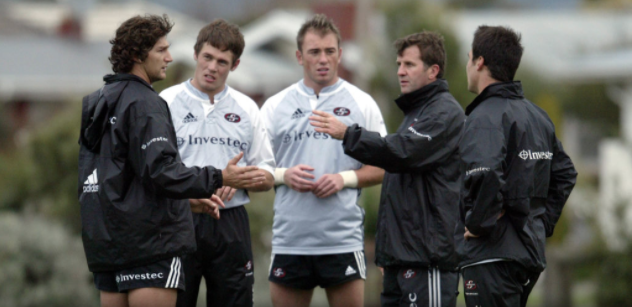Carel Du Plessis – better known as the Prince of Wings – was ahead of his time as a coach and would’ve fared better in the modern game, says former Springbok scrumhalf Werner Swanepoel.
Du Plessis played 12 Tests for the Springboks between 1982 and 1989, while he was also part of the legendary Western Province team that won five Currie Cup titles in a row.
Following his retirement from rugby, he was appointed as Springbok coach in 1997 – succeeding Andre Markgraff – despite have little coaching experience at the time.
His first task was to preside over the team during the 1997 British & Irish Lions tour to South Africa – and the visitors would go on to win the three-Test series 2-1. Du Plessis continued to coach the Boks until the end of the 1997 Tri-Nations – when he was replaced by Nick Mallett.
Swanepoel – who played under both Du Plessis and Mallett in his 20-cap Test career between 1997 and 2000 – said Du Plessis’ methods would have been more appreciated in modern rugby.
‘I believe Carel was ahead of his time. If I think about what he did with us back then and what the guys are doing now, it’s almost exactly the same,’ the scrumhalf told Sport24.
‘He was very technical. We went through a lot of team tactics and video sessions. In his autobiography, Bulletproof, James Dalton writes that Carel was “a remarkable rugby player but he had no clue about coaching an international rugby team.” I feel that’s harsh… Carel and Gert Smal were the first Springbok coaches I played under and made me a Springbok so I’m very grateful to them.
‘However, I agree with Bullet in terms of Nick being the best. I basically played my whole Test career under Mallett and have a helluva lot of respect for him. Every player just wants to know where they stand with a coach and that’s what Nick and Rassie did so well. Don’t tell me on Monday I’m good and then on the Wednesday tell the other scrumhalf he’s better. As a coach, just be honest.
‘Mallet’s contentious move was dropping Gary Teichmann for Bob Skinstad and making Joost captain for the 1999 World Cup. There have been documentaries made and interviews recorded on that subject and everything that was supposed to be said has been. Nick admitted he made a misjudgment but in hindsight it’s always easy to say.
‘Having won 17 consecutive Tests, I think we were good enough to win the World Cup. However, the exclusion of Teichmann had a huge impact on the team as he was our leader for a long time. It’s now water under the bridge but sadly myself and many of the guys from that era can’t say they won a World Cup.’
Photo: Simon Baker/Getty Images





